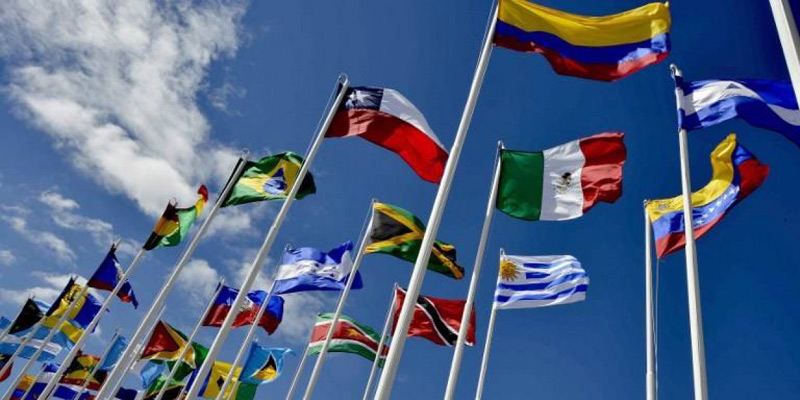Latin American Integration at a Key Moment
- Written by Redacción ¡ahora!
- Published in World
- Hits: 24826

The year 2019 is considered by many analysts as a trial period for the economic integration process in Latin America, as during the next few months it will be exposed to trade tensions generated worldwide and at the same time, to the effects of a sensitive weakening of the global economy.
The impact on the region of the trade war started by the United States against China is difficult to forecast, as it is true it can open the market of those countries to Latin American products to substitute those taxed by the conflict, on the other hand it is possible that imports of the countries involved in trade warring are restricted.
As for the perspectives of global economy, a contraction is expected, although of less impact than that of a recession, it will probably extend the fall in exchange values registered over the last months of 2018, while the hike in bank interest rates in the United States may have an additional negative effect on indebted countries of low development.
The perspectives for the region are not promising either, becajse it is expected to grow at a rate too slow to boost development, to the point that the Executive Secretary of the Economic Commission for Latin America and the Caribbean (Eclac), Alicia Barcena, called to redouble efforts to strengthen integration and expand trade among neighboring countries.
Latin Americans, she said, we still have much to do in terms of deepening integration.
Of course, of what everybody is certain is that any effort to strengthen integration has as one of its main challenges trying to increase intra-regional trade.
Official statistics indicate that trade between the Latin American countries only represents 20 percent of the total, while in other regions of the world such as Europe, Asia, that indicator ranges between 50 and 60 percent.
Last year, during the World Economic Forum on Latin America, held in Sao Paulo, it was clear that to face the new global, it is fundamental to reinforce integration and increase trade relations between neighboring countries.
In the study carried out by Eclac experts it became evident that fragmentation of the regional market is the factor of greater impact among the obstacles for the different integration models, including the most difficult still to solve than those of geographic or structural origin.
Along this line, there are cases like Argentina, whose exports to neighboring countries are incredibly scarce. This is shown in its sales to Uruguay which are half of those exported to Vietnam and to Paraguay, figures are equal to those sold to Indonesia.
REORIENT TRADE
In observations made in the Forum of Sao Paulo, Barcena proposed to change in the geographic áreas of greater preference for trade and to increase the flow of Exchange inside the region in order to create more Jobs and reduce the exit of hard currency to other continents.
She also recommended that the integration schemes include measures that make easier the mobility of persons and their insertion in labor markets when moving from one country to another.
From the historic point of view, the initiatives in favor of integration have been based on political and economic dialogue since the middle of last century when in 1962 was founded the Latin American Free Trade Association (Lafta) designed following a multilateral organism then existing in Europe.
The free trade model gathered great strength in the 90s, supported by neoliberal grou8ps that rose to power in several countries of South America, although it was already working in Chile since the coup of 1973 and imposed in Argentina by another military regime.
Critics of neoliberalism and its expansión South of the Rio Bravo attribute this boom to the pressure of U.S administrations and particularly the influence of the group of economists formed by the School of Chicago.
SINKING OF ALCA
Washington official circles pretended to impose then the neocolonial project in all the continent ansd in 1994 proposed the rest of the countries of the region to create a Free Trade Area of the Americas (ALCA) that since it was launched found a strong opposition from progressive forces until at the beginning of this century its defeat was complete.
However, the rightwing sectors have taken revenge in the last years and at present took over key positions, as in Argentina and Brazil.
The collusion of the two largest South American nations, supported by Paraguay, played a leading role in the suspension of the Bolivarian Republic of Venezuela as a member state of Mercosur position obtained with complete commitment to statutes of the organization.
The neoliberal governments have also opened amn offensive through the news media of their same political line against transforming movements including the organizations of economic integration of independent guidelines like tha Bolivarian Alliance for the Peoples of our America-Trade Treaty of the Peoples (ALBA-TCP).
With the formation of ALBA in 2004, a new kind of integration was revitalized, based on equality between states and the justice for all social segments.
Together with the Community of Latin American and Caribbean States and the Union of South American BNations ALBA is part of the progressive movement that today resists the attacks of oligarchical circles and groups of power that defend the old colonial structure. / PL
